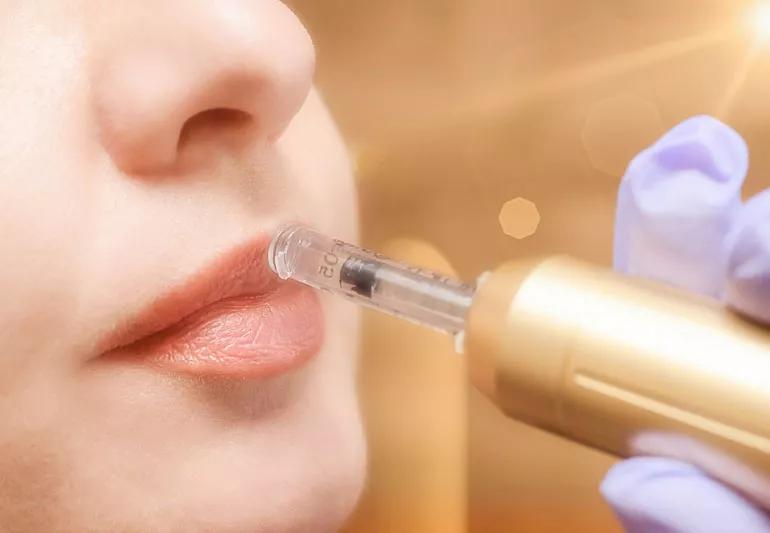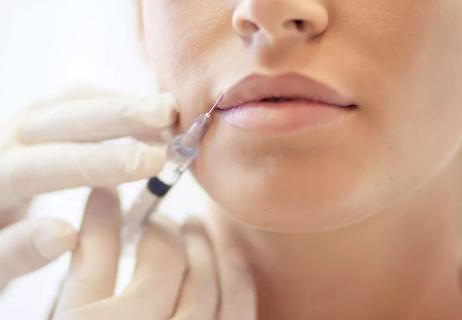Due to risks of bruising, scarring and infection, these needle-free injectors should be avoided

Who doesn’t love a DIY project? From candlemaking to woodworking, there are a lot of things in life you can learn to do on your own.
Advertisement
Cleveland Clinic is a non-profit academic medical center. Advertising on our site helps support our mission. We do not endorse non-Cleveland Clinic products or services. Policy
But while these projects are fun and useful hobbies that often carry minimal risk, some things in life are better left to the professionals. This is especially true when it comes to our bodies and health — and should be a “no-brainer” when it comes to a cosmetic procedure involving your face. In these cases, it’s definitely best to seek the hands of a professional.
Hyaluron pens began to rise in popularity during the pandemic, but plastic surgeons, dermatologists and skin care experts warn about the risks of their use. These at-home lip-plumping products — which are shockingly available over-the-counter through a simple internet search — claim to be a quick, needle-free way to give you fuller lips without a visit to your plastic surgeon or dermatologist.
“I can understand that someone may see a product like this in a TikTok video, or they heard of a friend-of-a-friend who had a ‘good result,’” says plastic surgeon Martin Newman, MD. “Unfortunately, some folks will try something without doing their homework simply because someone else has done it first and had an acceptable outcome.”
But Dr. Newman explains why you should take care when considering hyaluron pens — and how to make sure you’re pursuing cosmetic procedures in the safest way possible.
Advertisement
Hyaluron pens are needle-free devices that use compressed air pressure to push hyaluronic acid through your skin into the deeper tissue to help create the appearance of fuller, plumper lips. They claim to be modeled after handheld jet injectors that are often used for administering medications like immunizations and insulin.
When it comes to traditional lip fillers, a syringe and needle are used to inject the desired area with hyaluronic acid — an ingredient commonly used in traditional cosmetic procedures. “In the world of dermal fillers, there are a host of different materials we use to put under the skin to fill wrinkles and lines and restore volume,” explains Dr. Newman. “One of the most common such dermal filler materials is hyaluronic acid.”
But the makers of hyaluron pens claim that instead of the traditional needle-and-syringe process, the same hyaluronic acid can be applied to the desired area by pushing it through the skin or mucosa of the lip using highly pressurized air or a spring-loaded piston.
“This device essentially uses a cylinder-like tube filled with hyaluronic acid. The tube is pressed against the lip on one side while high pressure is released on the other — essentially, propelling the hyaluronic acid forward with the goal of driving the material through the skin,” Dr. Newman further explains. “The concept is that this device exerts enough pressure to actually push the substance through the skin into the body. Sounds pretty traumatic to me.”
If it sounds like Dr. Newman isn’t in favor of these devices, he isn’t alone. Other experts aren’t convinced this process is an effective way of delivering hyaluronic acid either. Nor are the devices approved by the U.S. Food and Drug Administration.
“The first question you really have to ask is: How can you push a dermal filler — whose physical properties are that of a viscous gel, like Jello® — through the skin?” adds Dr. Newman.
Remember, your skin is the largest organ in the body and shouldn’t take for granted. While it may sometimes feel like your skin can handle a lot — bruising, blemishes and mosquito bites — it can also be very vulnerable.
Here are some risks and dangers surrounding the use of hyaluron pens:
In October of 2021, the FDA released an official warning about needle-free devices such as the hyaluron pen. This statement strongly advises against using devices like this, as they haven’t been properly tested and can lead to side effects like infections, allergic reactions and more.
Part of the statement reads:
“The FDA is aware that needle-free devices, and lip and facial fillers for use with these devices, are sold online directly to the public, and their use is promoted on social media to increase lip volume, improve the appearance of wrinkles, change the shape of the nose, and other similar procedures. The FDA has not evaluated the safety and effectiveness of needle-free devices for injection of any dermal filler.”
Even if you’ve read every article, blog post and skin care forum on lip plumping, that still doesn’t make you certified to administer a procedure like this.
“My concern is that the procedure is not controllable,” warns Dr. Newman. “When doing a procedure like this, you need to have meticulous control over exactly where, what and how much you are injecting.”
Advertisement
Because of the nature of the administration with these devices, there is a significant risk of the “pens” not doing what you want them to do. Instead, Dr. Newman points out that this can lead to uneven results and much, much worse.
“With this device, it is like trying to stick a square peg in a round hole,” he says. “These devices are trying to use a well-established drug delivery system, which has been proven effective for water or oil-based medications and immunizations, to push a gel-like substance through skin and mucosa.
“Not only is this traumatic to the target area, but since everyone’s skin is different, you can’t control the depth of penetration, the amount administered or your individual results,” he continues. “Your control is minimal at best. With this knowledge in mind, it is obvious to understand how problems may arise.”
While hyaluronic acid is a commonly used material for dermal fillers, that doesn’t mean that all hyaluronic acid is created equal.That’s whyanother concern over these devices is about the type of hyaluronic acid supplied with the “pen.”
When hyaluronic acid is used in a doctor’s office, there’s a reasonable expectation that it has been tested, FDA-approved and selected by your doctor to be the best kind of material to be used for a given procedure. But if you’re buying a product online, you have no guarantee what you’re getting.
Advertisement
When it comes to cosmetic procedures, Dr. Newman says that there are always risks, benefits and alternatives that must be considered and weighed. But for the reasons outlined above, hyaluron pens may carry even higher risks. Plus, as these nonprescription devices are often used by nonmedical personnel, usually at home without medical supervision, complications may be unrecognized and/or untreated leading to a permanent deformity.
Some complications that can arise due to using hyaluron pens include, but aren’t limited to:
In our fast-paced world of social media, there’s a chance you’ll see a new skin care or cosmetic product being advertised every other week. And it’s easy to be swept up in the excitement of getting an expensive procedure done at home for a fraction of the cost. But with hyaluron pens, it’s a classic case of it simply being too good to be true.
Odds are that one of the reasons you’re considering a device like this is because you’ve heard it’s been done before. “What really adds fuel to the fire is the fact that someone else has done it and has had a reasonable result,” realizes Dr. Newman.
Advertisement
But just because a friend may have had a good experience or your favorite influencer is bragging about their results from a hyaluron pen, it doesn’t mean that you’ll experience the same outcome or that they’re safe to use.
Instead, if you’re interested in lip or dermal fillers, Dr. Newman advises you to consult a plastic surgeon or dermatologist who can recommend the best approach and administer an approved product in a safe setting.
“Once you’ve looked into this — and you don’t have to look very far — you’ll realize that these pens are not likely your best and safest option,” he reiterates. “If you’d like to try a dermal filler or similar type of procedures, it really is important to rely on the expertise of well-trained professionals.”
Your skin — and your smile — will thank you for it.
Learn more about our editorial process.
Advertisement

An ice pack and acetaminophen can help tame initial discomfort

The short answer from a board-certified dermatologist

The popular skin care ingredient can help smooth, brighten and strengthen your skin

It’s a great disinfectant for around your home, but not for your skin

Changes in texture, smell, color and performance are signs it’s time to throw the cosmetic item away

Follow the 4Cs — cooling, cleaning, covering and comforting — to start the healing process

Bathing once a day is the general guidance, but you could also have reasons to soap up twice a day or not at all
There’s not one specific cure-all diet for eczema, but it helps to keep track of what you eat and when you experience symptoms

The tropical fruit is a good source of antioxidants and vitamin C

Most people fall asleep within 10 to 20 minutes, but if your experience is different, adjusting your sleep schedule may help

Exploring your hidden side can lead to better understanding of what makes you tick